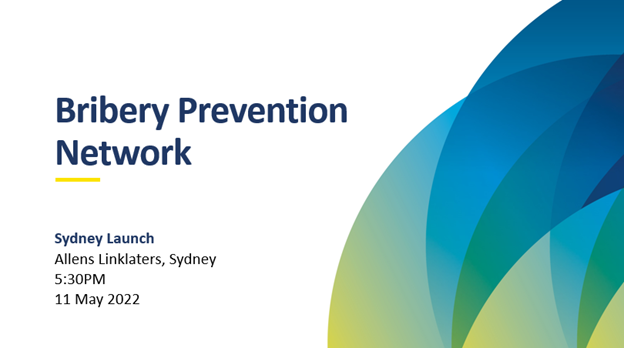
Last month, the Bribery Prevention Network (BPN) held its official Sydney launch, which brought together representatives from the private sector, government, and prosecution agencies to share their perspectives and advice to businesses with respect to addressing bribery and corruption risks.
Anti-bribery and corruption compliance is a key area of focus for regulators and governments both in Australia and worldwide. Breaches of laws can attract significant financial penalties and criminal prosecution as well as reputational damage. Navigating the regulatory landscape and establishing an effective anti-bribery and corruption framework can be challenging, particularly for small and medium-sized enterprises who may have limited resources to address bribery risk.
The event included a panel discussion moderated by James Campbell, Partner, Allens on this theme with guest speakers:
- Jeldee Robertson, Coordinator, Corporate Crime and Foreign Bribery, Crime Command Australian Federal Police.
- David Tonkin, Chief Counsel, Legal Procurement and Fraud Australian Trade and Investment Commission.
- Cindy McNair, Managing Associate, Disputes and Investigations, Allens.

The discussion centred on how businesses can best respond to foreign bribery and corruption, both before it occurs (by instituting effective bribery prevention and detection controls) and if an incident is detected (through self-reporting and co-operation with enforcement agencies).
Mr Tonkin of Austrade stressed that general awareness of the bribery and corruption landscape has now developed to the point that Australian businesses entering foreign markets can no longer claim to be ignorant of the associated risks. While Austrade can assist Australian companies operating in high-risk jurisdictions around the world, it is incumbent on businesses to take their own steps to effectively guard themselves against corruption threats. Like other business and operational risks, bribery or corruption can similarly impact profit margin or cash-flow.
Ms Robertson voiced the AFP’s perspective that the success of an anti-bribery and corruption policy is measured not by reference to the terms of the policy itself, but by considering how the policy is practically and effectively implemented in an organisation. The AFP’s assessment will focus on whether businesses can show that employees at all levels are ‘living and breathing’ the company’s training and policies and are aware of the specific bribery risks which may arise in their particular role. Ms Robertson also acknowledged that, where bribery has occurred, there are substantial benefits (including sentencing discounts) for businesses who self-report and cooperate with prosecutorial agencies, as demonstrated by recent court decisions.
In addition, Ms McNair of Allens emphasised that bribery is an intentional crime by its nature, and that businesses need to design their ABC policies to reflect the reality that employees may try to actively subvert the controls in place. To manage this, businesses should pay close attention to known tactics and mechanisms that facilitate bribery (for example, the use of third-party contractors and inflated invoices to make illicit payments appear legitimate). Ms McNair also highlighted the sharp increase in monetary awards provided by US regulators to individuals for voluntarily bringing credible information leading to successful enforcement. Ms McNair discussed how this trend reinforced the importance of promoting a ‘speak up’ culture within the organisation, as a company’s own employees are often the best resource for a business (and regulators) to identify potential wrongdoing.
Attendees also had the opportunity network with each other in small groups and share their perspectives on how they would manage bribery risks in a case study example.
The BPN looks forward to organising more in-person events that equip SMEs with the skills and tools to prevent, detect and address bribery and corruption in their organisations.

About the Bribery Prevention Network
The Bribery Prevention Network is a public-private partnership that brings together business, civil society, academia and government with the shared goal of supporting Australian business to prevent, detect and address bribery and corruption and promote a culture of compliance.
The BPN offers a free online portal of accessible, relevant and reliable resources, curated by Australia’s leading anti-bribery experts, to support Australian business to manage bribery and corruption risks in domestic and international markets.
UN Global Compact Network Australia is the host organisation of the BPN, and the contributing organisations are: Australia-Africa Minerals and Energy Group (AAMEG), Australian Federal Police (AFP), Allens Linklaters, ANZ, Australian Government Attorney-General’s Department, BHP, Commonwealth Bank, KPMG, Minerals Council of Australia, NAB, Transparency International Australia, Westpac.
